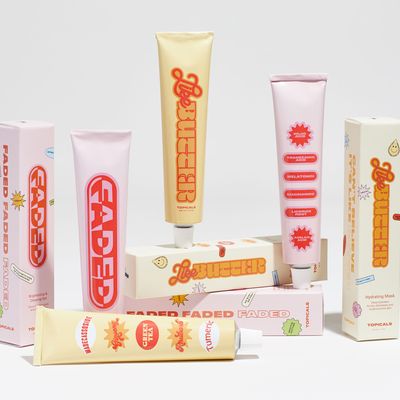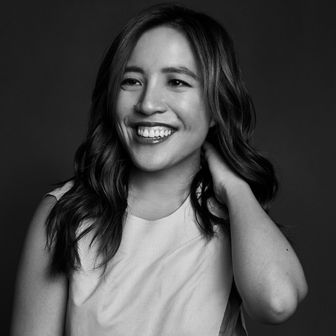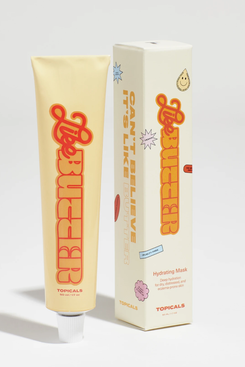
As Olamide Olowe and Claudia Teng put it, “Growing up sucked.” Both of them were women of color with chronic skin conditions who felt tormented by the beauty standards around skin. Popular girls didn’t have zits. Queen bees didn’t have to use medicated cream in a squeeze tube from the dermatologist. Their struggles led them to create Topicals, a new skin-care brand celebrating “itchy girls” and “spottie hotties.”
Topicals is for people who look at Glossier and think, “But that’s for people whose skin is already perfect.” The brand aims to reframe the discussion around skin care, moving away from a world where having acne or skin flare-ups is considered embarrassing. Partly, they’re doing it via their marketing, which has an overall ’90s-yearbook vibe: checkerboard logos, cloud shapes, general soft-girl aesthetics, and, of course, lots of millennial pink. Their Instagram and website feature moody selfies by people who aren’t trying to hide any bumps or red patches. And in a project called Burn Book, they’ve been asking their community to create entries for toxic beauty standards they wish would die.
In 48 hours, the brand sold out at Nordstrom (unfortunately, it’s still sold out). Investors include Bozoma Saint John, Issa Rae and Yvonne Orji. The Cut talked to Olowe and Teng about launching a company in college, reclaiming “problem” skin, and figuring out how to talk about skin in a healthy way.
How did the brand start?
Olamide Olowe: I grew up with the condition post-barbae folliculitis which made me really embarrassed. I didn’t wear a swimsuit until college. Then in college, I co-founded Shea Girl, a tween companion line to Shea Moisture. I learned all about creating brands for underserved communities. In 2017, our parent company got acquired by Unilever.
Claudia Teng: I grew up with really severe eczema, and felt embarrassed about it. People would say things like “It’s contagious.” I felt embarrassed about using the topical serums. I could never go to sleepovers without my products and didn’t want to answer questions about them.
In high school, I started working in the department of dermatology at Stanford as a research assistant. I continued that in college, at UC Berkeley where I studied pre-med, and then worked in clinical research, post-graduation. Olamide and I bounded over the shared experience of feeling isolated because of our skin. Voicing those frustrations connected us, and led us to create Topicals.
The beauty world is saturated with products. What do you think is missing?
OO: We are revolutionary in each category. Even on the formulation side, we see these as medicated botanics. We have Stanford’s head of pediatric dermatology on our board, and Claudia has been published multiple times in dermatological publications. We use powerful plants and synthetics, which deliver great results without being harsh.
CT: Our goal is to create better solutions, to be used supplementally with what your dermatologist gives you. We rely on medicated botanicals, a mix of clinically proven synthetics and natural ingredients, based on traditional Chinese medicine and ayurveda. We use those to more comprehensively treat the mechanism behind skin conditions. For example, our product Faded addresses hyperpigmentation, but we are conscious not to use hydroquinone, which has been used quite harshly in the past and carries a cultural stigma with bleaching, especially for darker skin tones.
If you have a chronic skin condition like eczema or psoriasis, it’s incurable. You’ll have it for the rest of your life. Managing chronic skin conditions is treated like a medical issue — a chore, burden, something you have to do. But that experience could be much more enjoyable. If you’re going to have it for the rest of your life, we want to make managing and treating it to some extent more fun. It’s about living your life with a chronic skin condition in a more unapologetic way.
The tagline for Topicals is “Funner flare-ups.” The messaging seems to be that breaking out or having a skin flare-up doesn’t have to be shameful.
CT: If you’ve ever been prescribed prescription topicals, you know that they always come in clinical-looking, ugly, squeeze-metal tubes. We want our design to change that, and to create something that you can feel happy and proud to pull out of your bag. In our aesthetic, the driving principle is to reclaim. We want to speak to a new experience of growing up with a chronic skin condition. We want to evoke the nostalgia of TV commercials and old-school skin-care ads, and turn it on its head. We want to remix it in a way where the popular girls now have skin conditions, and it isn’t taboo to talk about.
Do you think that “perfect” skin still exists?
OO: What does it mean to have “perfect” skin? For a long time, women have been shown one type of skin, mostly Eurocentric. It’s people with clear skin and tiny pores. For our imagery, we take everyday people we think are beautiful, with visible chronic conditions, and showcase them across on our website. It’s about normalizing what’s real, not airbrushed pictures. We see Gen Z as more of a psychographic than a demographic. We want to transform how people feel about skin.
CT: Perfect skin is currently represented as poreless, with little variation in skin texture and color. That’s not realistic at all. Skin is often messy, just like life. Sometimes your skin can be very healthy, and sometimes it can be not so healthy. It’s unrealistic to think that it will stay in one condition for life.
What do you see as the connection between mental health and skin care?
OO: Skin care as self-care has been on the rise for years now. Partially because of lack of access to therapy, people have been looking for more ways to relax. Taking care of yourself is self-care and defiance against the working world and stress of it. A lot of people look for skin-care brands that can give that sense of peace and relaxation.
CT: It’s very common to experience anxiety and depression because of a skin condition. People with skin conditions often feel alienated or misunderstood. And then you can have the experience, especially if you’re a person of color, of going to your dermatologist and now have that person understand your skin. There needs to be more awareness about the negative effect of the way that we talk about skin color and type, and how deeply that can affect our happiness and mental health. We definitely wanted to make it a pillar of our brand from the very start.
Every product is independently selected by our editors. Things you buy through our links may earn us a commission.





